Stay Informed
Popular Articles
- Hiatal Hernia: Hidden Cause of Chronic Illness
- Small Intestinal Bacterial Overgrowth (SIBO)
- Applied Lymphology: Unlocking the Secret to Pain Relief
- An Introduction to Constitutional Iridology
- The Low Down on Liver Detoxification
- An Energetic and Emotional Approach to Cancer
- Fat Facts
- Marrow in the Bones
- Blood Type and Nutrition
- Cardiac Herbs: Beyond Hawthorn
Quick Search
The School of Modern Herbal Medicine




Getting Rid of Parasites
- 11/2/2016
- Categorized in: Specific Health Problems
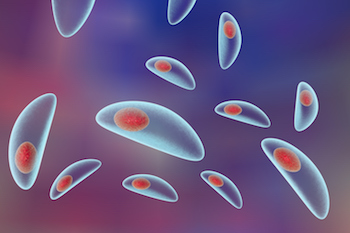 This article was adapted from Chapter Eight of my book, Coming Clean.
This article was adapted from Chapter Eight of my book, Coming Clean.
Even when we're healthy, our intestinal tract is a zoo of living creatures. Hopefully, we're playing host to friendly organisms like lactobacillus bacteria, but sometimes the creatures in our intestinal zoo are dangerous critters to our health. Parasites are far more common than people realize. They can be picked up from household pets, foreign travel, contaminated water or food, or open wounds.
Parasite problems are so evasive to regular medical investigation that no one can accurately estimate how much of the population may be afflicted by parasites. Present estimates range from 25-80% for Americans.
Parasites aren’t just worms, either. Harmful microbes including giardia, candida and amoebas can also be classified as parasites. When organisms like these are included, it is likely that at least two-thirds of all Americans have at least one type of parasite in their body.
Symptoms usually depend on the type of parasite, but generally they include nervousness, grinding teeth at night (especially children), constant hunger with unsatisfied appetite, itching rectum, severe health problems that develop after foreign travel, and constant gastrointestinal problems like nausea, diarrhea and sensitive bowels. Parasites can also cause chronic fatigue, bad breath, anemia, ulcers, itching, chronic nose picking, mood swings and insomnia.
Problems with Parasites
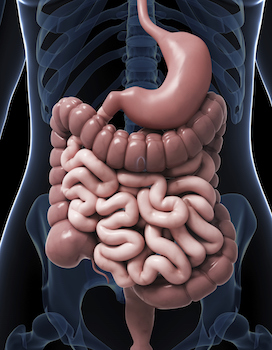 Parasites can be very hard to diagnose. A stool analysis may or may not reveal the existence of parasites because, even if parasites are present in the bowel, they may or may not be present in any particular stool sample. Parasites may also be in other body tissues and not show up in the bowel.
Parasites can be very hard to diagnose. A stool analysis may or may not reveal the existence of parasites because, even if parasites are present in the bowel, they may or may not be present in any particular stool sample. Parasites may also be in other body tissues and not show up in the bowel.
Even when diagnosed correctly, parasites can be very hard to eliminate. It takes very powerful medications to kill parasites and typically, those medications are toxic to healthy tissue as well. Even some of the stronger anti-parasitic herbs have some toxicity. However, our approach to parasites is going to be only partially effective if we focus only on trying to kill them.
While parasites may be present in many chronic diseases, they aren't really the root cause. All parasites require a supportive host environment in order to survive. If the host environment isn’t conducive to its growth, a parasite will have a difficult time gaining a foothold.
So, we also need to change the host environment to make it unfriendly for the growth of parasites. This is where herbs can excel over chemical drugs. While they may not be as strong at directly killing the parasites, they are exceptionally good at helping to alter the host environment and making it unfriendly to parasites. When combined with general cleansing, improved diet, and other healthy habits, herbal parasite cleanses can be very effective.
Know the Enemy
One of the most common parasitical organisms in North Americans is Candida albicans, a species of yeast. Candida is present even in healthy colons, but it multiplies out of control when the acidophilus and bifidophilus in the intestinal tract are killed by antibiotics. Yeast overgrowth causes immune weakness, cravings for sugar, frequent colds, sore throats, sinus infections and fatigue. It may become systemic, resulting in finger and toenail infections, vaginal yeast infections and itching skin. Ringworm is actually a fungal infection of the skin and can often be treated topically.
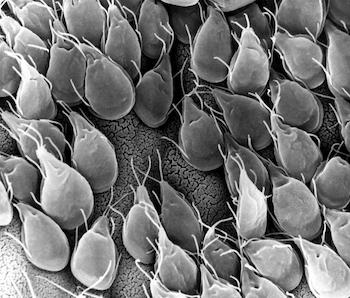 Another common single-celled parasite is giardia (pictured left from Wikipedia). Giardia is picked up by drinking contaminated water and causes diarrhea. Amoebas are another intestinal parasite that cause severe diarrhea (amoebic dysentery). Although not commonly thought of as a parasite, H. pylori is a bacteria that can infect the stomach and intestines and is associated with ulcers.
Another common single-celled parasite is giardia (pictured left from Wikipedia). Giardia is picked up by drinking contaminated water and causes diarrhea. Amoebas are another intestinal parasite that cause severe diarrhea (amoebic dysentery). Although not commonly thought of as a parasite, H. pylori is a bacteria that can infect the stomach and intestines and is associated with ulcers.
There are also several types of worms that may infect the body. Tapeworms are probably the biggest, and can range from one inch to thirty feet (yes, feet) long. They are believed to live up to 25 years and can cause weight loss, abdominal pain, vomiting and diarrhea.
Roundworms (including protozoa and flukes), ascarids, and hookworms are contagious intestinal parasites. They are shaped like earthworms but smaller. Hookworms can also infect the feet and cause itching there. The smaller roundworms can infect muscles and also damage the heart and nervous system. Large roundworms and whipworms can cause respiratory problems and may crawl up into the throat and, in extreme cases, exit through the mouth or nose.
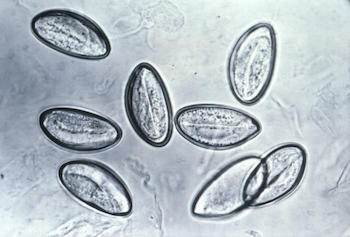 Pinworms show up as short white threads less than half an inch long. Pinworms can cause severe anal itching and trouble sleeping. They may leave through the rectum at night to lay eggs. They are the most common worm problem for young children and are easily passed around the family. Pinworm eggs are shown in the picture on the right (from Wikipedia).
Pinworms show up as short white threads less than half an inch long. Pinworms can cause severe anal itching and trouble sleeping. They may leave through the rectum at night to lay eggs. They are the most common worm problem for young children and are easily passed around the family. Pinworm eggs are shown in the picture on the right (from Wikipedia).
Precautions to prevent spreading worms would include washing bed linens, bed clothes and underwear of entire family, having infected child take daily morning showers to remove eggs deposited in the perianal region during the night, using disinfectants daily on the toilet seat and bathtub, and being sure everybody washes their hands (and fingernails of those infected) before meals. In fact, the entire family should do a parasite cleanse.
These are not the only parasites it is possible to have. There are about 1,000 known types of parasites. Fortunately, natural remedies are fairly broad acting, so it isn't necessary to know exactly what parasites are present in order to get rid of them.
Choose Your Weapons
Herbs that work against parasites are classified as anthelmintics/vermifuges (expel or destroy worms) or parasiticides (kill parasites). Some herbs are directly toxic to parasites. Some “stun” or relax them so that they can’t stay in place and are eliminated with regular bowel movements. Other herbs clean up the host terrain, making the environment unfriendly to parasites, encouraging them to leave. Effective herbal therapy for parasites involves a combination of all of these strategies.
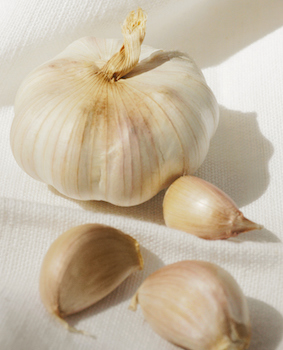 There are many herbs which can help fight parasites. For instance, Garlic, especially if taken raw (so that it still has plenty of the stinky allicin), is useful against bacteria, yeast and worms. However, for maximum effectiveness, raw garlic is best used in an enema. It’s also helpful to fast for at least 24 hours before doing the garlic enema and clearing the colon with a plain water enema first. Blend one or two cloves of garlic into a couple of quarts of water. Strain and inject rectally with an enema, then try to retain as long as possible.
There are many herbs which can help fight parasites. For instance, Garlic, especially if taken raw (so that it still has plenty of the stinky allicin), is useful against bacteria, yeast and worms. However, for maximum effectiveness, raw garlic is best used in an enema. It’s also helpful to fast for at least 24 hours before doing the garlic enema and clearing the colon with a plain water enema first. Blend one or two cloves of garlic into a couple of quarts of water. Strain and inject rectally with an enema, then try to retain as long as possible.
Internally, Nature’s Sunshine has a High Potency Garlic that uses a chlorophyll coating to reduce odor and prevent the tablet from breaking down until it reaches the small intestine. Each tablet has a total allicin potential of 1,200 mg. This is about the same as about four cloves of fresh garlic. You would take about 2-4 of these tablets each day.
Black walnut is another reliable herb for parasites. Tourists in tropical climates should take black walnut frequently to avoid diarrhea due to unclean water. Black walnut is an effective astringent and helps tighten tissues and restore tone to bowel tissues. It's also a good antiparasitic remedy for children and pets because it's not toxic like some of the other anti-parasitic herbs.
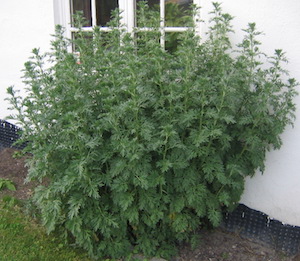 Plants in the Artemisia genus include some of the strongest anti-parasitic herbs available. These include wormwood, sweet annie, mugwort and sagebrush. These plants are fragrant bitters, both aromatic and bitter, and are all slightly toxic. Wormwood contains thujone, an component in its essential oil that can stun roundworms. Because of their toxicity, they should be avoided by small children and pregnant or nursing mothers. They have bowel cleansing and powerful anthelmintic effects and are safest when used as part of a formula.
Plants in the Artemisia genus include some of the strongest anti-parasitic herbs available. These include wormwood, sweet annie, mugwort and sagebrush. These plants are fragrant bitters, both aromatic and bitter, and are all slightly toxic. Wormwood contains thujone, an component in its essential oil that can stun roundworms. Because of their toxicity, they should be avoided by small children and pregnant or nursing mothers. They have bowel cleansing and powerful anthelmintic effects and are safest when used as part of a formula.
Another very potent, but toxic anti-parasitic herb is male fern. This one should also be used as part of a formula and administered by a professional herbalist.
Herbs containing berberine, like goldenseal, can be helpful for giardia and harmful bacteria in the intestines. Other single herbal remedies for parasites include clove, elecampane, pumpkin seeds and quassia. Here are some possible combinations you can use: AP Compound (Herbalist and Alchemist), Artemesia Combination (Nature’s Sunshine Products) and Intestinal Tract Defense (Herb Pharm).
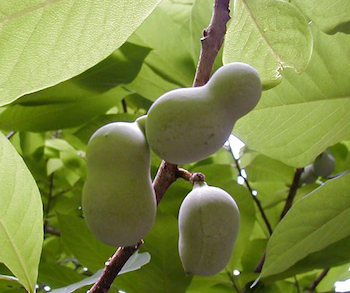 I really like Nature’s Sunshine’s Parasite cleaning pack, ParaCleanse. It contains several anti-parasitic formulas and an product called Paw Paw Cell Reg, which adds the special property of killing parasites by reducing their ability to create life energy.
I really like Nature’s Sunshine’s Parasite cleaning pack, ParaCleanse. It contains several anti-parasitic formulas and an product called Paw Paw Cell Reg, which adds the special property of killing parasites by reducing their ability to create life energy.
Paw Paw Cell-Reg is primarily used to fight abnormal cell growth (including cancer cells) and is very effective against parasites because it is also a natural insecticide. It works by reducing the ability of the mitochondria (“energy factories”) in cells to convert nutrients into energy for their own life functions. Specifically, it blocks the production of adenosine triphosphate (ATP), a cellular energy storage molecule that causes single-celled organisms and worms to die because of their rapid metabolism. I think Paw Paw Cell Reg makes ParaCleanse one of the best parasite cleansing products available.
Doing a Parasite Cleanse
Some parasites reproduce through a multi-stage life cycle. Eggs may be protected in a durable shell, so that even if you take an anti-parasitic product now, those eggs will survive and hatch, and the larvae will promptly create a reinfestation. The solution is to use a program that repeats the treatment several times. Since family members often share parasites with each other, best results are obtained when all family members follow the program at the same time.
Start by doing a regular colon cleanse. This removes old fecal material that may be present and gets the colon in a healthier condition, which makes it easier to get rid of the parasites.
Next, do one 10-day Para-Cleanse Program. This involves taking one packet of the Para-Cleanse 15 minutes before breakfast and another 15 minutes before dinner for ten days. Be sure to drink plenty of water. If your bowels don’t move regularly, you may wish to add some fiber or a stimulant laxative.
After completing the first round of the parasite cleanse wait one week. It might be a good idea to do a regular colon cleanse during this week.
The one-week break allows any eggs that may have been present to hatch. So, now do a second 10-day round of the Para-Cleanse program.
For really serious parasite problems, this process can be repeated two or three times, following the Para-Cleanse Program for 10 days, then taking a one-week break.
At the end of the program, be sure to take probiotics. This is because the strong herbs in the parasite cleanse also effect gut microbes and you want to provide healthy strains of bacteria to repopulate the gut. These will also help to displace parasites and prevent reinfestation by other organisms.
Giardia
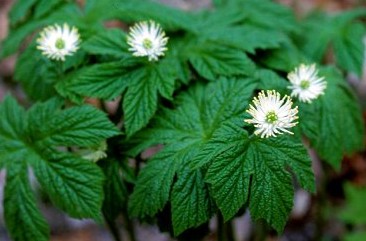 One special parasite worth mentioning is giardia, a very common single-celled parasite. Drinking water from open streams is a common way to be infected by Giardia cysts, but food and hand-to-mouth contact may also transmit the disease.
One special parasite worth mentioning is giardia, a very common single-celled parasite. Drinking water from open streams is a common way to be infected by Giardia cysts, but food and hand-to-mouth contact may also transmit the disease.
Ten grams of goldenseal daily for ten days has been proven effective in ridding the body of Giardia. The addition of ginger (1 three times daily) and activated charcoal (2 two or three times daily) can help eliminate the diarrhea that accompanies this infection.
Remember that isn’t enough to just try to kill the parasites. One has to restore a healthy environment to the gastrointestinal tract. So make sure you adopt a healthier diet and work on your overall health, too.
